吉林大学:《大学英语泛读》课程电子教案(PPT课件)01 Skills(主讲教师:朱丽娟)

Reading Comprehension Skills
Reading Comprehension Skills

By reading comprehension,"we mean how well one can read.If a student is good at reading comprehension,"then he or she is able to read with a high degree of efficiency and obtain maximum information from a text with minimum misunderstanding(误解).We are going to suggest ways you can improve your reading comprehension
By " reading comprehension," we mean how well one can read . If a student is " good at reading comprehension," then he or she is able to read with a high degree of efficiency and obtain maximum information from a text with minimum misunderstanding(误解). We are going to suggest ways you can improve your reading comprehension

1.reading for the main idea -- 袋What is the most important element(成分)in any paragraph or passage?Without a doubt,it is the main idea or the central idea,which gives the paragraph or passage a purpose and direction.Naturally,the first step to improve your comprehension is to practise reading a bit faster for the main idea
1. reading for the main idea What is the most important element(成分) in any paragraph or passage? Without a doubt , it is the main idea or the central idea , which gives the paragraph or passage a purpose and direction. Naturally, the first step to improve your comprehension is to practise reading a bit faster for the main idea
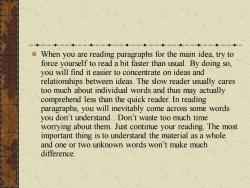
米 When you are reading paragraphs for the main idea,try to force yourself to read a bit faster than usual.By doing so, you will find it easier to concentrate on ideas and relationships between ideas.The slow reader usually cares too much about individual words and thus may actually comprehend less than the quick reader.In reading paragraphs,you will inevitably come across some words you don't understand.Don't waste too much time worrying about them.Just continue your reading.The most important thing is to understand the material as a whole and one or two unknown words won't make much difference
When you are reading paragraphs for the main idea, try to force yourself to read a bit faster than usual. By doing so, you will find it easier to concentrate on ideas and relationships between ideas. The slow reader usually cares too much about individual words and thus may actually comprehend less than the quick reader. In reading paragraphs, you will inevitably come across some words you don’t understand . Don’t waste too much time worrying about them. Just continue your reading. The most important thing is to understand the material as a whole and one or two unknown words won’t make much difference
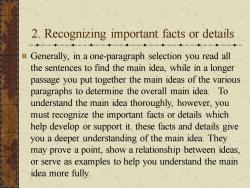
2.Recognizing important facts or details 米( Generally,in a one-paragraph selection you read all the sentences to find the main idea,while in a longer passage you put together the main ideas of the various paragraphs to determine the overall main idea.To understand the main idea thoroughly,however,you must recognize the important facts or details which help develop or support it.these facts and details give you a deeper understanding of the main idea.They may prove a point,show a relationship between ideas, or serve as examples to help you understand the main idea more fully
2. Recognizing important facts or details Generally, in a one-paragraph selection you read all the sentences to find the main idea, while in a longer passage you put together the main ideas of the various paragraphs to determine the overall main idea. To understand the main idea thoroughly, however, you must recognize the important facts or details which help develop or support it. these facts and details give you a deeper understanding of the main idea. They may prove a point, show a relationship between ideas, or serve as examples to help you understand the main idea more fully
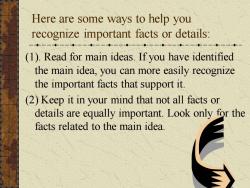
Here are some ways to help you recognize important facts or details: 一■一 (1).Read for main ideas.If you have identified the main idea,you can more easily recognize the important facts that support it. (2)Keep it in your mind that not all facts or details are equally important.Look only for the facts related to the main idea
Here are some ways to help you recognize important facts or details: (1). Read for main ideas. If you have identified the main idea, you can more easily recognize the important facts that support it. (2) Keep it in your mind that not all facts or details are equally important. Look only for the facts related to the main idea

(3)To check on your understanding of the material you have read,review the facts or details which you have decided are the most important.Then consider if they support what you have identified as the main idea.If adding up the facts or details does not lead logically to the main idea,you have failed either to identify the main idea or to recognize the important supporting details
(3)To check on your understanding of the material you have read, review the facts or details which you have decided are the most important. Then consider if they support what you have identified as the main idea. If adding up the facts or details does not lead logically to the main idea, you have failed either to identify the main idea or to recognize the important supporting details
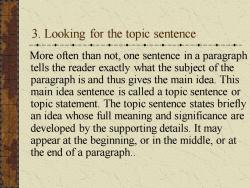
3.Looking for the topic sentence More often than not,one sentence in a paragraph tells the reader exactly what the subject of the paragraph is and thus gives the main idea.This main idea sentence is called a topic sentence or topic statement.The topic sentence states briefly an idea whose full meaning and significance are developed by the supporting details.It may appear at the beginning,or in the middle,or at the end of a paragraph
3. Looking for the topic sentence More often than not, one sentence in a paragraph tells the reader exactly what the subject of the paragraph is and thus gives the main idea. This main idea sentence is called a topic sentence or topic statement. The topic sentence states briefly an idea whose full meaning and significance are developed by the supporting details. It may appear at the beginning, or in the middle, or at the end of a paragraph
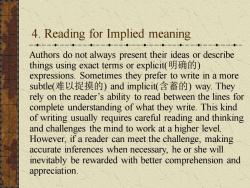
4.Reading for Implied meaning Authors do not always present their ideas or describe things using exact terms or explicit(明确的) expressions.Sometimes they prefer to write in a more subtle(难以捉摸的)and implicit(含蓄的)way.They rely on the reader's ability to read between the lines for complete understanding of what they write.This kind of writing usually requires careful reading and thinking and challenges the mind to work at a higher level. However,if a reader can meet the challenge,making accurate inferences when necessary,he or she will inevitably be rewarded with better comprehension and appreciation
4. Reading for Implied meaning Authors do not always present their ideas or describe things using exact terms or explicit(明确的) expressions. Sometimes they prefer to write in a more subtle(难以捉摸的) and implicit(含蓄的) way. They rely on the reader’s ability to read between the lines for complete understanding of what they write. This kind of writing usually requires careful reading and thinking and challenges the mind to work at a higher level. However, if a reader can meet the challenge, making accurate inferences when necessary, he or she will inevitably be rewarded with better comprehension and appreciation
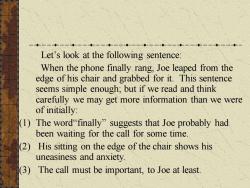
Let's look at the following sentence: When the phone finally rang,Joe leaped from the edge of his chair and grabbed for it.This sentence seems simple enough;but if we read and think carefully we may get more information than we were of initially: (1)The word finally"suggests that Joe probably had been waiting for the call for some time. (2) His sitting on the edge of the chair shows his uneasiness and anxiety. (3) The call must be important,to Joe at least
Let’s look at the following sentence: When the phone finally rang, Joe leaped from the edge of his chair and grabbed for it. This sentence seems simple enough; but if we read and think carefully we may get more information than we were of initially: (1) The word“finally” suggests that Joe probably had been waiting for the call for some time. (2) His sitting on the edge of the chair shows his uneasiness and anxiety. (3) The call must be important, to Joe at least
按次数下载不扣除下载券;
注册用户24小时内重复下载只扣除一次;
顺序:VIP每日次数-->可用次数-->下载券;
- 吉林大学:《大学英语泛读》课程教学资源(试卷习题)试卷B(答案).doc
- 吉林大学:《大学英语泛读》课程教学资源(试卷习题)试卷B(试题).doc
- 吉林大学:《大学英语泛读》课程教学资源(试卷习题)试卷A(答案).doc
- 吉林大学:《大学英语泛读》课程教学资源(试卷习题)试卷A(试题).doc
- 广东医科大学:《英语写作》课程电子教案(PPT教学课件)Zero Degree & Deviation of Lexis.ppt
- 广东医科大学:《英语写作》课程电子教案(PPT教学课件)17 Rhetorical Operation for Effective Sentences(review-writing effective sentences).ppt
- 广东医科大学:《英语写作》课程电子教案(PPT教学课件)16 research report.ppt
- 广东医科大学:《英语写作》课程电子教案(PPT教学课件)15 Thematic Progression in Wirting(rheme & theme).ppt
- 广东医科大学:《英语写作》课程电子教案(PPT教学课件)14 TEM-rhetorical operation at syntactical level(Operation of Positive Deviation).ppt
- 广东医科大学:《英语写作》课程电子教案(PPT教学课件)13 TEM8-argumentation Essay.ppt
- 广东医科大学:《英语写作》课程电子教案(PPT教学课件)12 TEM8-topic sentence.ppt
- 广东医科大学:《英语写作》课程电子教案(PPT教学课件)11 TEM8-title(Developing Plans from Titles).ppt
- 广东医科大学:《英语写作》课程电子教案(PPT教学课件)10 TEM8作文试卷评析(主讲:颜静兰).ppt
- 广东医科大学:《英语写作》课程电子教案(PPT教学课件)09 zero degree at syntactical level.ppt
- 广东医科大学:《英语写作》课程电子教案(PPT教学课件)08 hypothesis and parathesis(Rhetoric at Syntactic Level).ppt
- 广东医科大学:《英语写作》课程电子教案(PPT教学课件)07 lexical deviaton.ppt
- 广东医科大学:《英语写作》课程电子教案(PPT教学课件)06 The Principle of Rhetoric - Deviation(zero degree and deviation).ppt
- 广东医科大学:《英语写作》课程电子教案(PPT教学课件)05 stasis model 争议模式.ppt
- 广东医科大学:《英语写作》课程电子教案(PPT教学课件)04 Cubing Analysis.ppt
- 广东医科大学:《英语写作》课程电子教案(PPT教学课件)03 Audience Analysis.ppt
- 吉林大学:《大学英语泛读》课程电子教案(PPT课件)10 Richard Nixon’s Childhood.ppt
- 吉林大学:《大学英语泛读》课程电子教案(PPT课件)11 The Importance of Just Being There.ppt
- 吉林大学:《大学英语泛读》课程电子教案(PPT课件)12 Where Do Dreams Come from?.ppt
- 吉林大学:《大学英语泛读》课程电子教案(PPT课件)13 After Twenty Years.ppt
- 吉林大学:《大学英语泛读》课程电子教案(PPT课件)14 The Bermuda Triangle.ppt
- 吉林大学:《大学英语泛读》课程电子教案(PPT课件)15 Washington, D.C..ppt
- 吉林大学:《大学英语泛读》课程电子教案(PPT课件)16 A Young Detective’s Adventures.ppt
- 吉林大学:《大学英语泛读》课程电子教案(PPT课件)17 Young Detective’s Adventures - Looking for Clues.ppt
- 吉林大学:《大学英语泛读》课程电子教案(PPT课件)18 A Young Detective’s Adventures - The Mystery.ppt
- 吉林大学:《大学英语泛读》课程电子教案(PPT课件)19 Sam and His Store.ppt
- 吉林大学:《大学英语泛读》课程电子教案(PPT课件)02 Reading Comprehension.ppt
- 吉林大学:《大学英语泛读》课程电子教案(PPT课件)20 Today’s Dropouts.ppt
- 吉林大学:《大学英语泛读》课程电子教案(PPT课件)21 One Million Dollars Cy Rice.ppt
- 吉林大学:《大学英语泛读》课程电子教案(PPT课件)22 First Teacher in Outer Space.ppt
- 吉林大学:《大学英语泛读》课程电子教案(PPT课件)23 The Honor Code.ppt
- 吉林大学:《大学英语泛读》课程电子教案(PPT课件)24 A Double-Dyed Deceiver.ppt
- 吉林大学:《大学英语泛读》课程电子教案(PPT课件)25 Port Royal.ppt
- 吉林大学:《大学英语泛读》课程电子教案(PPT课件)26 Creative Justice.ppt
- 吉林大学:《大学英语泛读》课程电子教案(PPT课件)27 The Midnight Visitor.ppt
- 吉林大学:《大学英语泛读》课程电子教案(PPT课件)28 Dad, Why Did You Do It?.ppt
